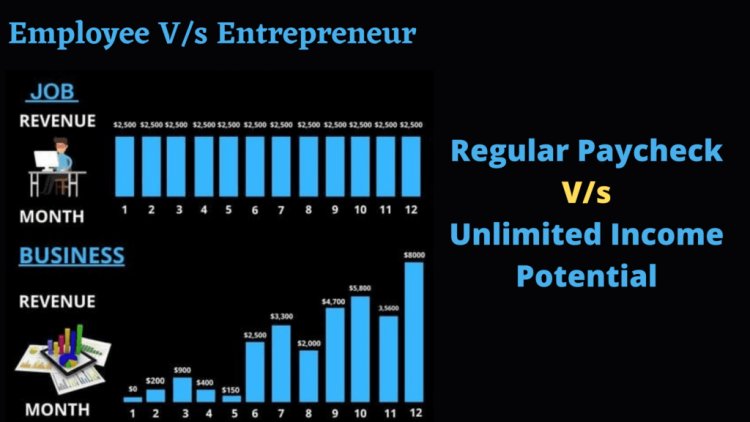Is it better to be an entrepreneur or an employee?
Being an entrepreneur or an employee both have there varied differences and positive ends. Keep reading to choose what is right for you.

This is an extremely essential graphic representation of the two routes we may all choose. On the one end, you are renting your time to a firm in order to participate in an antiquated and failing system that allows the company, executives, and C-suite to function.
- Advantages include a consistent wage, prospective benefits, and a predictable income (as long as the business stays in business and keeps you employed).
- Downsides include restricted earnings (a capped income potential), no asset in situ, and only being physically compensated by exchanging your time for money.
It may be both thrilling and stressful to go from employee to entrepreneur. Even if you work in the same field, one distinction between an entrepreneur and an employee is that establishing a firm requires you to forego a regular income, paid holidays, and health insurance benefits. Entrepreneurship comes with a lot of challenges, but it also has a lot of potential benefits.
Tip
To make the transition from employee to entrepreneur, you must be prepared to take chances and compromise portions of your life in order to focus on your work. Starting your own firm, on the other hand, can provide you with better financial advantages and the opportunity to structure your job precisely as you want it.
Employee vs. Entrepreneur
Ascending Innovator discusses how being an entrepreneur puts you in charge. You create your own timetable, goals, and success criteria. If your firm succeeds, the financial benefits will almost certainly be greater than those you'd receive as an employee. If you don't work from 9 a.m. to 5 p.m. Monday through Friday, having your own schedule is ideal. It might be possible to set up your firm so that you perform most of your work at night if you're a night owl. You can wake up, work for a bit, and then go back to sleep if you had a bad night's sleep. When you're marching to the beat of someone else's drum, it's more difficult.
On the other hand, financial gains may take some time to arrive. You may have to run a tight ship and trim costs to the bone for the first year or two or three. When compared to the feast-or-famine financial situations that many companies face, a consistent payment every week or two weeks may appear to be a good deal. You must also survive without paid time off or contributions from your work to your health care coverage. Being an entrepreneur vs. being an employee comes with a lot greater stress. When you're in command, whether you're a single act or managing a team, everything ultimately falls on you. Given the significant possibility of company failure, this might put you under a lot of pressure.
Which is better: Entrepreneurship or Employment?
According to Entrepreneur, there are significant distinctions between how entrepreneurs and workers approach their professions. If you're contemplating whether to be an entrepreneur or an employee, consider which side of the fence you land on.
- Employees strive to compensate for their flaws. Entrepreneurs acknowledge their flaws and focus on their strengths.
- Employees aspire to be the best at what they do. Because entrepreneurs have no one else to answer to, they may be ready to take a chance on delivering subpar work.
- Employees progress by taking on as much responsibility as feasible and increasing their skill sets on a regular basis.
- Entrepreneurs delegate, decline certain possibilities and concentrate on the aspects of the work that only they are capable of doing.
- People who are brighter than they are might intimidate certain workers. They are hired by entrepreneurs.
Entrepreneurship
- The contrast between an entrepreneur and an employee in terms of work-life balance is significant. Many workers strive to strike a balance between their work commitments and their commitments to their families and personal life. When you run your own business, you have to understand that you won't be able to balance everything: certain aspects of your life will suffer as a result of your job. If maintaining a sense of balance is vital to you, consider again before starting your own business.
- The prospect of going without a consistent wage or health insurance is daunting to some people. Some people believe that gambling on entrepreneurship is an undesirable way to support their families. People who choose to be entrepreneurs are willing to take a risk. Some even thrive on unpredictability.
- Being an entrepreneur has its advantages, but it also has its drawbacks. When entrepreneurs initially start out, they're generally thought of like a one-man show, which means they have to do everything alone. This often entails working extremely long hours, managing many tasks, and always coming up with new ideas. You will, however, be able to reap the benefits once you have learned to overcome the obstacles.
When it comes to deciding between entrepreneur and employee, there is no right or wrong answer. Only you can decide what is good or wrong for you.


 Local BangaloreTeam
Local BangaloreTeam 










